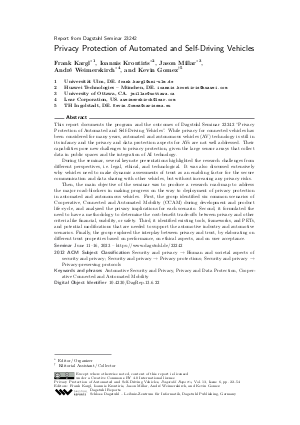Privacy Protection of Automated and Self-Driving Vehicles (Dagstuhl Seminar 23242)
Authors Frank Kargl, Ioannis Krontiris, Jason Millar, André Weimerskirch, Kevin Gomez and all authors of the abstracts in this report
-
Part of:
Issue:
Dagstuhl Reports, Volume 13, Issue 6
Part of: Volume: Dagstuhl Reports, Volume 13
Part of: Journal: Dagstuhl Reports (DagRep) - License:
 Creative Commons Attribution 4.0 International license
Creative Commons Attribution 4.0 International license
- Publication Date: 2024-02-01
File

PDF
DagRep.13.6.22.pdf
- Filesize: 2.71 MB
- 33 pages
Document Identifiers
Subject Classification
ACM Subject Classification
- Security and privacy → Human and societal aspects of security and privacy
- Security and privacy → Privacy protections
- Security and privacy → Privacy-preserving protocols
Keywords
- Automotive Security and Privacy
- Privacy and Data Protection
- Cooperative Connected and Automated Mobility
Metrics
- Access Statistics
-
Total Accesses (updated on a weekly basis)
0PDF Downloads0Metadata Views
Abstract
This report documents the program and the outcomes of Dagstuhl Seminar 23242 "Privacy Protection of Automated and Self-Driving Vehicles". While privacy for connected vehicles has been considered for many years, automated and autonomous vehicles (AV) technology is still in its infancy and the privacy and data protection aspects for AVs are not well addressed. Their capabilities pose new challenges to privacy protection, given the large sensor arrays that collect data in public spaces and the integration of AI technology. During the seminar, several keynote presentations highlighted the research challenges from different perspectives, i.e. legal, ethical, and technological. It was also discussed extensively why vehicles need to make dynamic assessments of trust as an enabling factor for the secure communication and data sharing with other vehicles, but without increasing any privacy risks. Then, the main objective of the seminar was to produce a research road-map to address the major road-blockers in making progress on the way to deployment of privacy protection in automated and autonomous vehicles. First, the group identified six common scenarios of Cooperative, Connected and Automated Mobility (CCAM) during development and product life-cycle, and analyzed the privacy implications for each scenario. Second, it formulated the need to have a methodology to determine the cost-benefit trade-offs between privacy and other criteria like financial, usability, or safety. Third, it identified existing tools, frameworks, and PETs, and potential modifications that are needed to support the automotive industry and automotive scenarios. Finally, the group explored the interplay between privacy and trust, by elaborating on different trust properties based on performance, on ethical aspects, and on user acceptance.
Cite As Get BibTex
Frank Kargl, Ioannis Krontiris, Jason Millar, André Weimerskirch, and Kevin Gomez. Privacy Protection of Automated and Self-Driving Vehicles (Dagstuhl Seminar 23242). In Dagstuhl Reports, Volume 13, Issue 6, pp. 22-54, Schloss Dagstuhl – Leibniz-Zentrum für Informatik (2024)
https://doi.org/10.4230/DagRep.13.6.22
BibTex
@Article{kargl_et_al:DagRep.13.6.22,
author = {Kargl, Frank and Krontiris, Ioannis and Millar, Jason and Weimerskirch, Andr\'{e} and Gomez, Kevin},
title = {{Privacy Protection of Automated and Self-Driving Vehicles (Dagstuhl Seminar 23242)}},
pages = {22--54},
journal = {Dagstuhl Reports},
ISSN = {2192-5283},
year = {2024},
volume = {13},
number = {6},
editor = {Kargl, Frank and Krontiris, Ioannis and Millar, Jason and Weimerskirch, Andr\'{e} and Gomez, Kevin},
publisher = {Schloss Dagstuhl -- Leibniz-Zentrum f{\"u}r Informatik},
address = {Dagstuhl, Germany},
URL = {https://drops.dagstuhl.de/entities/document/10.4230/DagRep.13.6.22},
URN = {urn:nbn:de:0030-drops-196375},
doi = {10.4230/DagRep.13.6.22},
annote = {Keywords: Automotive Security and Privacy, Privacy and Data Protection, Cooperative Connected and Automated Mobility}
}
